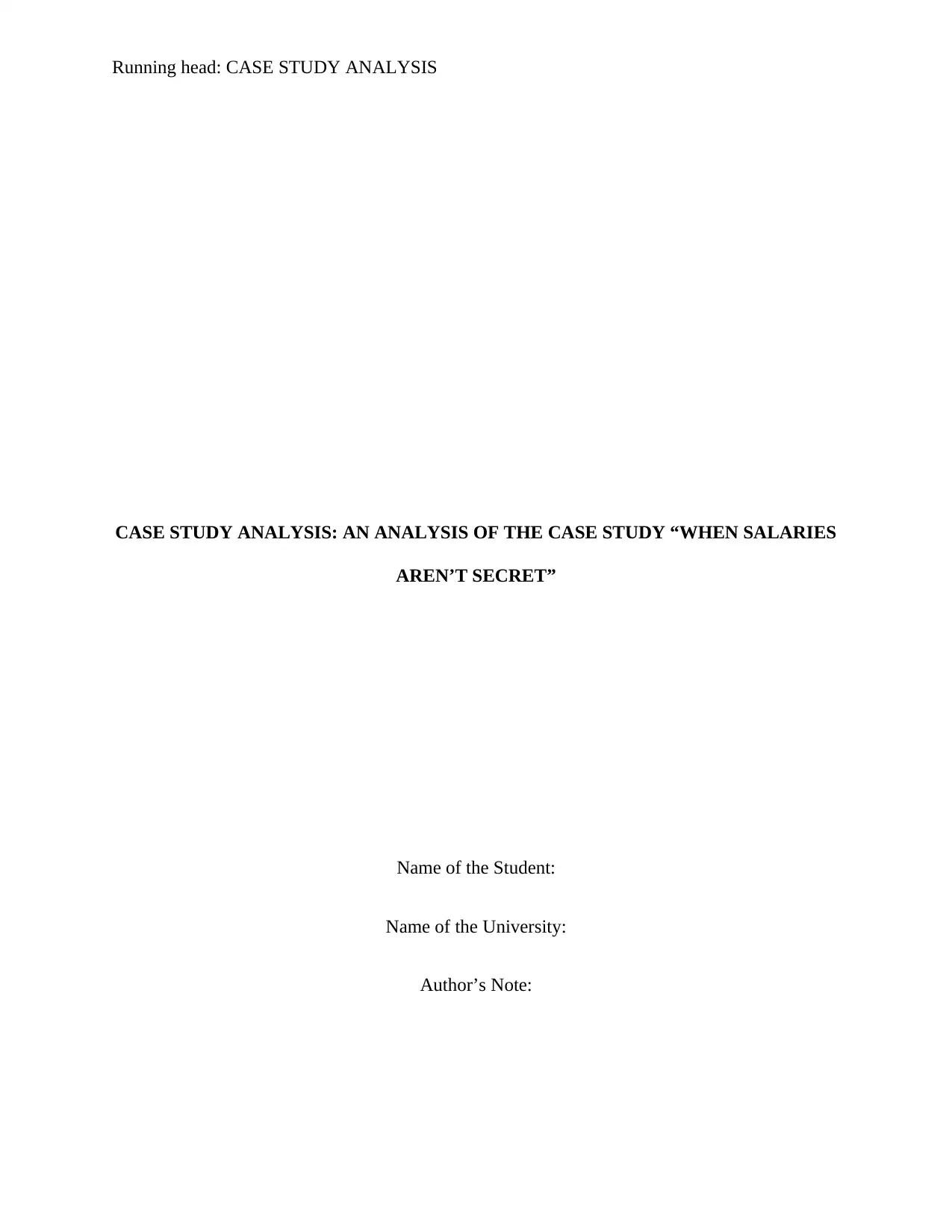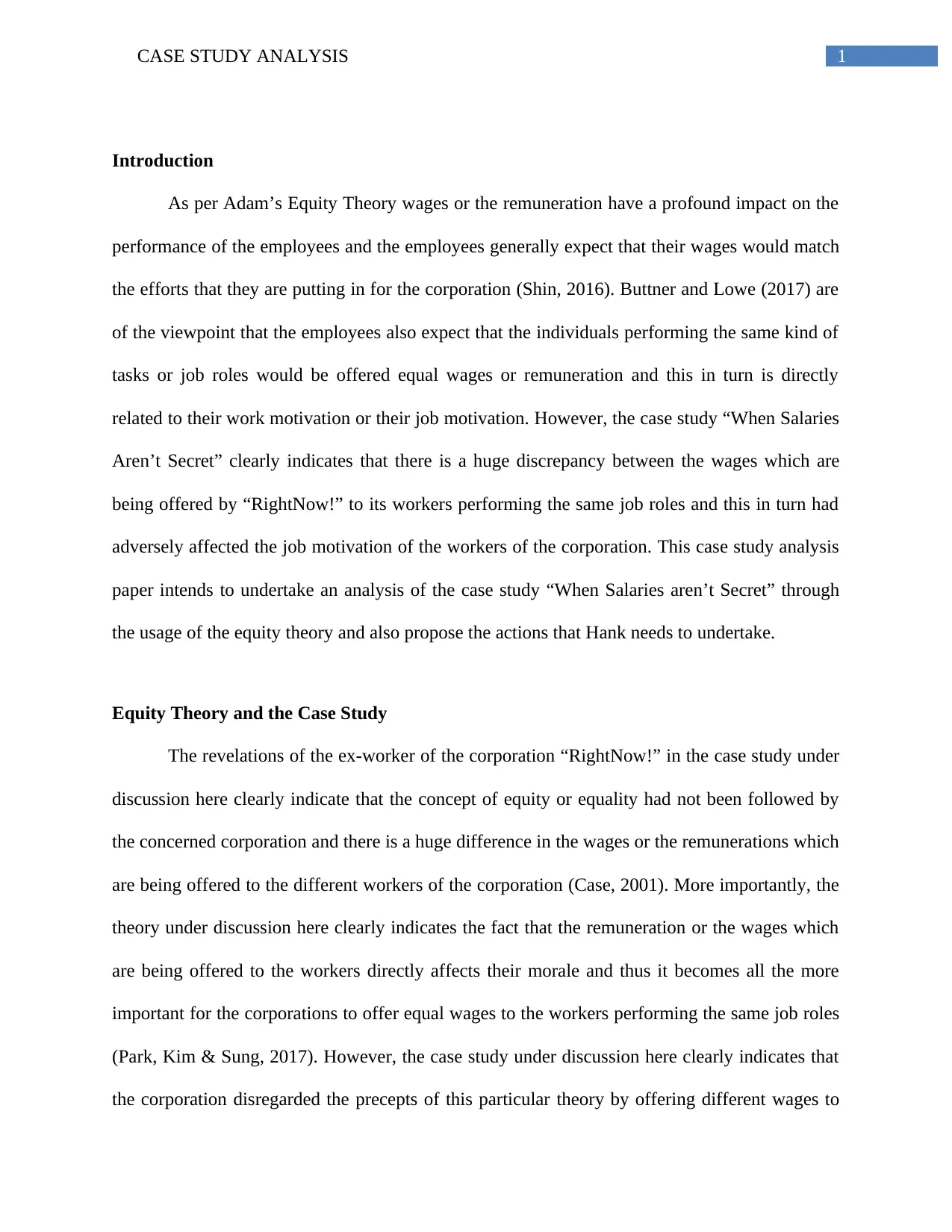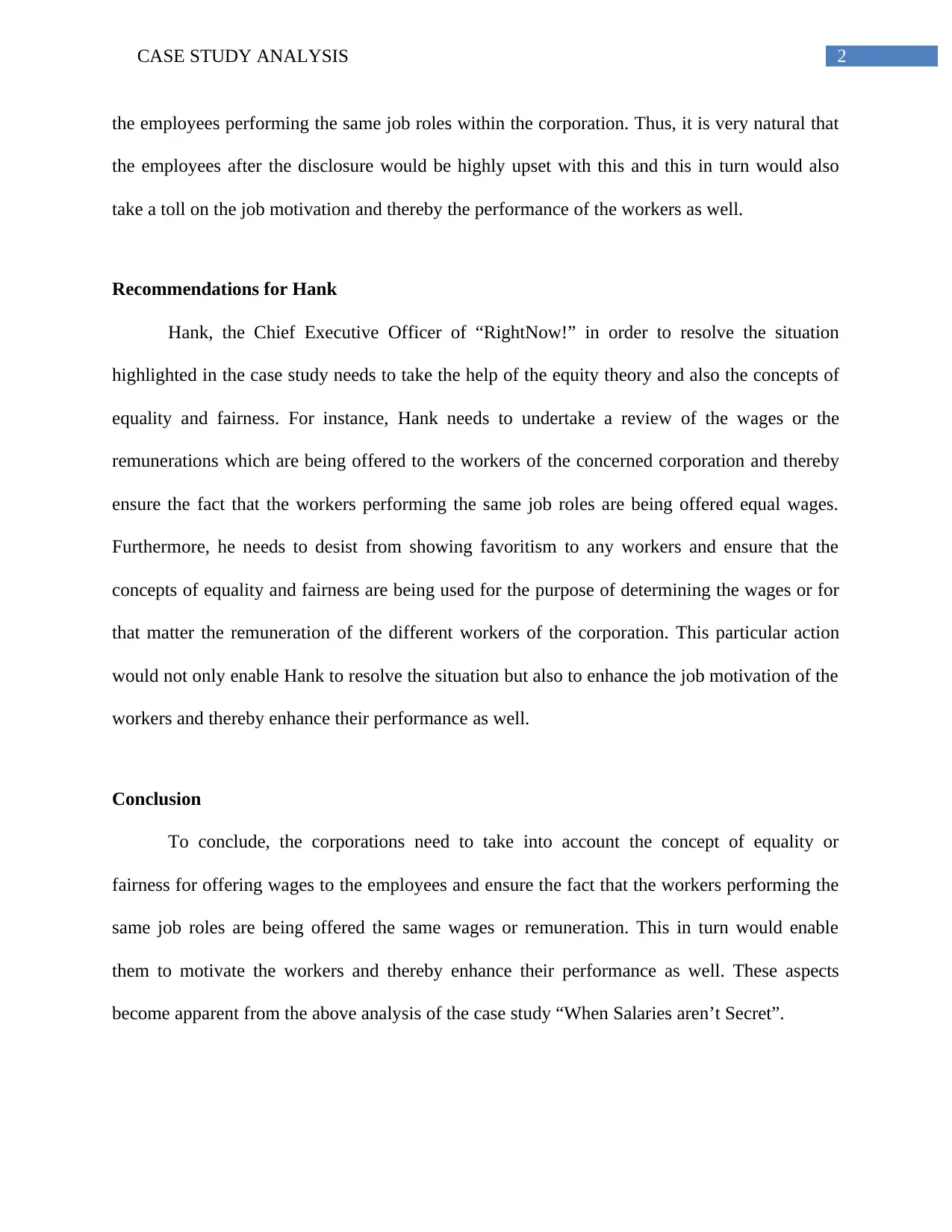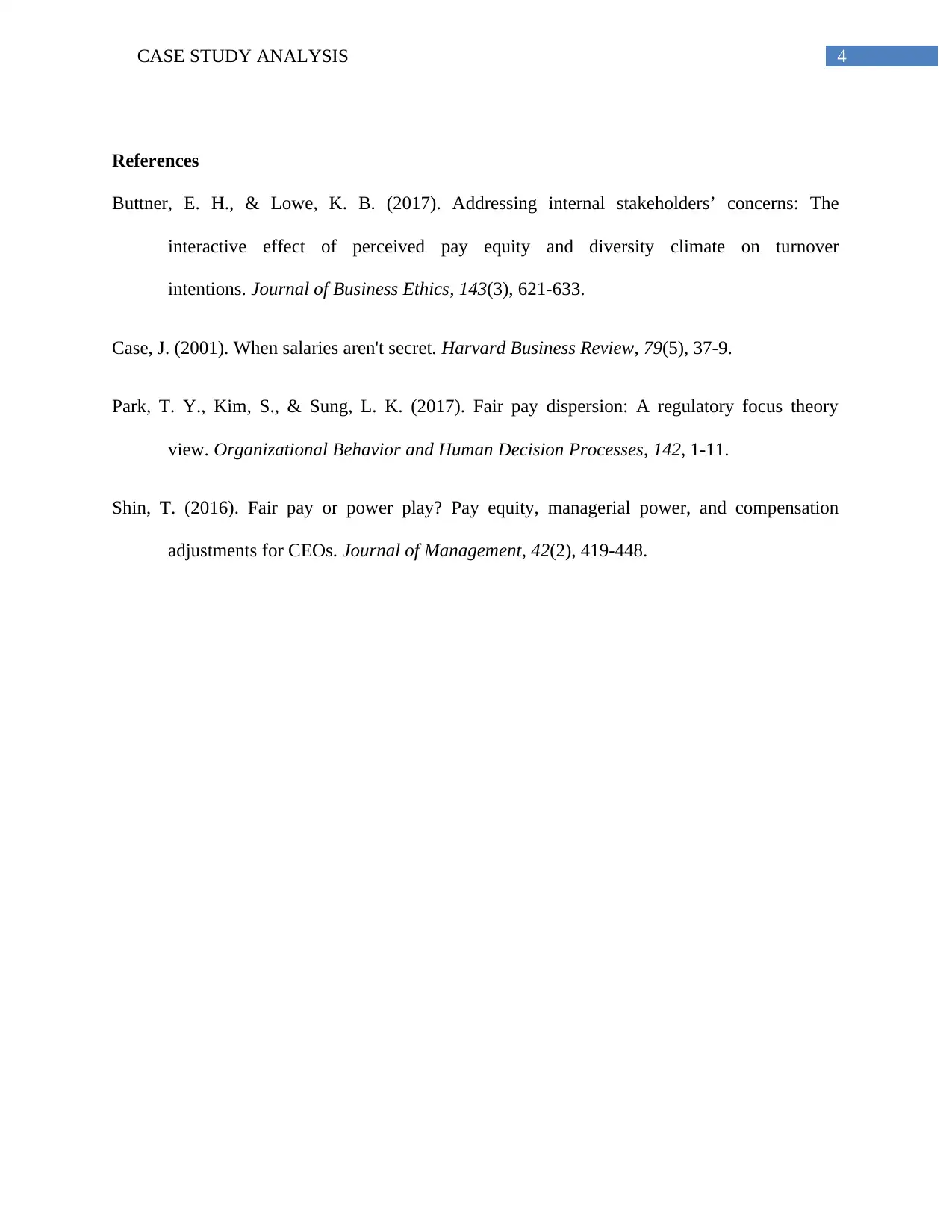Case Study Analysis: Equity Theory and RightNow! Case Study Solution
VerifiedAdded on 2022/08/19
|5
|843
|32
Case Study
AI Summary
This case study analysis focuses on the "When Salaries Aren't Secret" case, examining the impact of salary discrepancies on employee motivation at RightNow!. The analysis applies equity theory to explain why employees are upset by unequal pay for the same job roles. The study highlights the importance of fair compensation and its direct link to employee morale and performance. Recommendations are provided for Hank, the CEO, to address the issue by reviewing and equalizing salaries, ensuring fairness, and avoiding favoritism. The analysis concludes that corporations must prioritize equity in compensation to foster motivation and improve employee performance. This document, contributed by a student, offers valuable insights into leadership management and the practical application of equity theory in a business setting.

Running head: CASE STUDY ANALYSIS
CASE STUDY ANALYSIS: AN ANALYSIS OF THE CASE STUDY “WHEN SALARIES
AREN’T SECRET”
Name of the Student:
Name of the University:
Author’s Note:
CASE STUDY ANALYSIS: AN ANALYSIS OF THE CASE STUDY “WHEN SALARIES
AREN’T SECRET”
Name of the Student:
Name of the University:
Author’s Note:
Paraphrase This Document
Need a fresh take? Get an instant paraphrase of this document with our AI Paraphraser

1CASE STUDY ANALYSIS
Introduction
As per Adam’s Equity Theory wages or the remuneration have a profound impact on the
performance of the employees and the employees generally expect that their wages would match
the efforts that they are putting in for the corporation (Shin, 2016). Buttner and Lowe (2017) are
of the viewpoint that the employees also expect that the individuals performing the same kind of
tasks or job roles would be offered equal wages or remuneration and this in turn is directly
related to their work motivation or their job motivation. However, the case study “When Salaries
Aren’t Secret” clearly indicates that there is a huge discrepancy between the wages which are
being offered by “RightNow!” to its workers performing the same job roles and this in turn had
adversely affected the job motivation of the workers of the corporation. This case study analysis
paper intends to undertake an analysis of the case study “When Salaries aren’t Secret” through
the usage of the equity theory and also propose the actions that Hank needs to undertake.
Equity Theory and the Case Study
The revelations of the ex-worker of the corporation “RightNow!” in the case study under
discussion here clearly indicate that the concept of equity or equality had not been followed by
the concerned corporation and there is a huge difference in the wages or the remunerations which
are being offered to the different workers of the corporation (Case, 2001). More importantly, the
theory under discussion here clearly indicates the fact that the remuneration or the wages which
are being offered to the workers directly affects their morale and thus it becomes all the more
important for the corporations to offer equal wages to the workers performing the same job roles
(Park, Kim & Sung, 2017). However, the case study under discussion here clearly indicates that
the corporation disregarded the precepts of this particular theory by offering different wages to
Introduction
As per Adam’s Equity Theory wages or the remuneration have a profound impact on the
performance of the employees and the employees generally expect that their wages would match
the efforts that they are putting in for the corporation (Shin, 2016). Buttner and Lowe (2017) are
of the viewpoint that the employees also expect that the individuals performing the same kind of
tasks or job roles would be offered equal wages or remuneration and this in turn is directly
related to their work motivation or their job motivation. However, the case study “When Salaries
Aren’t Secret” clearly indicates that there is a huge discrepancy between the wages which are
being offered by “RightNow!” to its workers performing the same job roles and this in turn had
adversely affected the job motivation of the workers of the corporation. This case study analysis
paper intends to undertake an analysis of the case study “When Salaries aren’t Secret” through
the usage of the equity theory and also propose the actions that Hank needs to undertake.
Equity Theory and the Case Study
The revelations of the ex-worker of the corporation “RightNow!” in the case study under
discussion here clearly indicate that the concept of equity or equality had not been followed by
the concerned corporation and there is a huge difference in the wages or the remunerations which
are being offered to the different workers of the corporation (Case, 2001). More importantly, the
theory under discussion here clearly indicates the fact that the remuneration or the wages which
are being offered to the workers directly affects their morale and thus it becomes all the more
important for the corporations to offer equal wages to the workers performing the same job roles
(Park, Kim & Sung, 2017). However, the case study under discussion here clearly indicates that
the corporation disregarded the precepts of this particular theory by offering different wages to

2CASE STUDY ANALYSIS
the employees performing the same job roles within the corporation. Thus, it is very natural that
the employees after the disclosure would be highly upset with this and this in turn would also
take a toll on the job motivation and thereby the performance of the workers as well.
Recommendations for Hank
Hank, the Chief Executive Officer of “RightNow!” in order to resolve the situation
highlighted in the case study needs to take the help of the equity theory and also the concepts of
equality and fairness. For instance, Hank needs to undertake a review of the wages or the
remunerations which are being offered to the workers of the concerned corporation and thereby
ensure the fact that the workers performing the same job roles are being offered equal wages.
Furthermore, he needs to desist from showing favoritism to any workers and ensure that the
concepts of equality and fairness are being used for the purpose of determining the wages or for
that matter the remuneration of the different workers of the corporation. This particular action
would not only enable Hank to resolve the situation but also to enhance the job motivation of the
workers and thereby enhance their performance as well.
Conclusion
To conclude, the corporations need to take into account the concept of equality or
fairness for offering wages to the employees and ensure the fact that the workers performing the
same job roles are being offered the same wages or remuneration. This in turn would enable
them to motivate the workers and thereby enhance their performance as well. These aspects
become apparent from the above analysis of the case study “When Salaries aren’t Secret”.
the employees performing the same job roles within the corporation. Thus, it is very natural that
the employees after the disclosure would be highly upset with this and this in turn would also
take a toll on the job motivation and thereby the performance of the workers as well.
Recommendations for Hank
Hank, the Chief Executive Officer of “RightNow!” in order to resolve the situation
highlighted in the case study needs to take the help of the equity theory and also the concepts of
equality and fairness. For instance, Hank needs to undertake a review of the wages or the
remunerations which are being offered to the workers of the concerned corporation and thereby
ensure the fact that the workers performing the same job roles are being offered equal wages.
Furthermore, he needs to desist from showing favoritism to any workers and ensure that the
concepts of equality and fairness are being used for the purpose of determining the wages or for
that matter the remuneration of the different workers of the corporation. This particular action
would not only enable Hank to resolve the situation but also to enhance the job motivation of the
workers and thereby enhance their performance as well.
Conclusion
To conclude, the corporations need to take into account the concept of equality or
fairness for offering wages to the employees and ensure the fact that the workers performing the
same job roles are being offered the same wages or remuneration. This in turn would enable
them to motivate the workers and thereby enhance their performance as well. These aspects
become apparent from the above analysis of the case study “When Salaries aren’t Secret”.
⊘ This is a preview!⊘
Do you want full access?
Subscribe today to unlock all pages.

Trusted by 1+ million students worldwide

3CASE STUDY ANALYSIS
Paraphrase This Document
Need a fresh take? Get an instant paraphrase of this document with our AI Paraphraser

4CASE STUDY ANALYSIS
References
Buttner, E. H., & Lowe, K. B. (2017). Addressing internal stakeholders’ concerns: The
interactive effect of perceived pay equity and diversity climate on turnover
intentions. Journal of Business Ethics, 143(3), 621-633.
Case, J. (2001). When salaries aren't secret. Harvard Business Review, 79(5), 37-9.
Park, T. Y., Kim, S., & Sung, L. K. (2017). Fair pay dispersion: A regulatory focus theory
view. Organizational Behavior and Human Decision Processes, 142, 1-11.
Shin, T. (2016). Fair pay or power play? Pay equity, managerial power, and compensation
adjustments for CEOs. Journal of Management, 42(2), 419-448.
References
Buttner, E. H., & Lowe, K. B. (2017). Addressing internal stakeholders’ concerns: The
interactive effect of perceived pay equity and diversity climate on turnover
intentions. Journal of Business Ethics, 143(3), 621-633.
Case, J. (2001). When salaries aren't secret. Harvard Business Review, 79(5), 37-9.
Park, T. Y., Kim, S., & Sung, L. K. (2017). Fair pay dispersion: A regulatory focus theory
view. Organizational Behavior and Human Decision Processes, 142, 1-11.
Shin, T. (2016). Fair pay or power play? Pay equity, managerial power, and compensation
adjustments for CEOs. Journal of Management, 42(2), 419-448.
1 out of 5
Related Documents
Your All-in-One AI-Powered Toolkit for Academic Success.
+13062052269
info@desklib.com
Available 24*7 on WhatsApp / Email
![[object Object]](/_next/static/media/star-bottom.7253800d.svg)
Unlock your academic potential
Copyright © 2020–2026 A2Z Services. All Rights Reserved. Developed and managed by ZUCOL.





